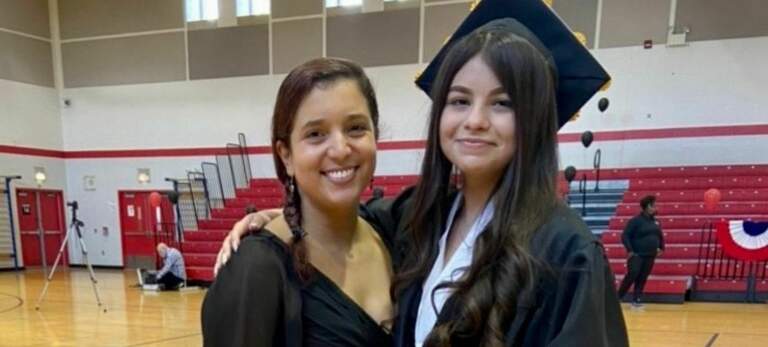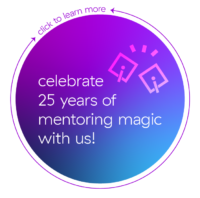iMentor interviewed Alexandra Abadia, a Puerto Rican mentor from Chicago, about her relationship with Hispanic Heritage Month. Her mentee Daniela is currently a sophomore in college and graduated from Phoenix Military Academy in 2021.
Did you have any mentors growing up? If so, in what ways did your mentors help shape your life?
I had quite a few mentors growing up, starting from older family members, teachers, and even friends at certain points. The one that really stands out to me would be my aunt, who unfortunately passed away my freshman year of college. But even after that, she continues to shape my life. She taught me the value of working hard towards something you care about and even more importantly, she taught me how important it is to serve others. From her influence, serving others is one of my core values.
What drew you into volunteering?
I started volunteering when I was very young. Luckily, it was part of my schooling, and it just became a regular part of my life. Starting from when I was a kid, I would write letters to children in the hospital, I would make them toys, make them gift baskets, and things like that. Through all my work with Ronald McDonald House growing up, that just kind of drew me into volunteering. After I finished my schooling, I just decided to get involved again. Volunteering is just my happy place; whenever I'm able to help someone, even if through the smallest gesture, it makes me feel like I am paying it forward. I enjoy volunteering just to spread joy and happiness to others.
Tell me about your mentee. Was there any specific bonding moment?
My mentee - her name is Daniela and she is an incredible individual. She's currently a sophomore in college. She grew up in Chicago; I grew up in Florida. She has a lot of siblings, I have one sister. So, we come from very different backgrounds, but we learned early on that we value a lot of the same things. Family, compassion, creativity, and service are all important shared core values. She doesn't know this, but she helped me get through the darkest period of my life just by being there for me. So, I feel a strong connection with Daniela and I'm excited to see how her future is going to continue to grow.
What does Hispanic Heritage Month mean to you?
Hispanic Heritage Month reminds me of the power and resilience [of our community]. It reminds me that we've gotten so far as a culture and as a society, but we have so much further to go. I honestly believe that in my time here on Earth, I will see the time when there is true equality and equity. I can never lose that feeling. I think that's what's most important. We need to just keep moving and keep being resilient.
How important is mentoring in the lives of students of color?
I believe that mentoring is important in everyone's life, regardless of race or ethnicity. However, I recognize that students of color don't have the same access to the same tools and resources, whether it be guidance counselors, teachers, or mentors. So, it's important to provide these students with the same opportunities as other students to ensure that they have the same access to education, to work, and opportunities in general. Organizations like iMentor are critical to exposing these students to paths that they may have never even thought about or known were possible.
How can mentoring organizations better support students of Hispanic heritage on their road to college and through college?
What I found most valuable in my time with iMentor was beyond just the resources and the tools that they provided students. It was about the real-life experiences that they gave mentors and mentees and how they offered the opportunities to have a resume writing workshop, in-office visits to the mentor’s place of work, or even on-campus visits for potential schools. All these types of opportunities open the different paths that are available to the students. I believe organizations can make a real impact by providing the physical tools and resources to facilitate experiential learning opportunities. Matching tools and hands-on experiences are key to creating meaningful change.
Are there any resources, materials, or activities have you found effective in fostering discussions about Hispanic culture and history?
You know, there's so much out there. My personal favorite thing is to read memoirs, or inspirational novels, from Hispanic authors. That always has been very uplifting for me and kind of reminded me of what's important. One of my favorite novels is called Esperanza Rising. It's by Pam Muñoz Ryan and I read it growing up. It is about a young Mexican-American girl and her story of coming into adulthood. It was really moving for me. If students can find different voices that can speak to them in their own journeys, I think that is what will help them have these conversations about race and will help them thrive in our day and age.
What advice would you give other adults who may be hesitant to become a mentor?
I would say to just be open. I think a lot of times we may put too much pressure or too high of expectations on ourselves. The reality is that students aren't looking for a perfectly put-together adult. They just want to learn from someone who is real and who can be open and authentic, someone who can share their struggles as well as their achievements, their weaknesses as well as their strengths. So be patient with yourself and this will allow you to adapt your mentoring style to meet the specific needs and goals of your mentee. You do this by simply getting to know them as the students are and meeting them where they are currently in their lives.

